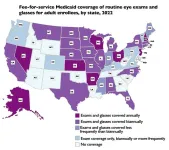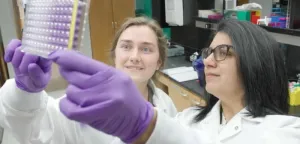(Press-News.org) TUCSON, Ariz., August 6, 2024 — Critical Path Institute’s (C-Path) Critical Path for Alpha-1 Antitrypsin Deficiency (CPA-1) consortium today announced the addition of several key advisory members. The new members, recognized experts in their respective fields and patient advocacy organizations, will contribute their significant expertise to the consortium’s mission to accelerate drug development for Alpha-1 Antitrypsin Deficiency (AATD), a rare genetic disorder.
Joining the consortium are:
Alpha-1 Foundation
COPD Foundation
Global Liver Institute
Jon Hagstrom, Board Member, Alpha-1 Foundation
Noel G. McElvaney, Royal College of Surgeons in Ireland
Marc Miravitlles, M.D., Pulmonologist at the Pneumology Department, University Hospital Vall d’Hebron / Vall d’Hebron Research Institute in Barcelona, Spain
Jeff Teckman, M.D., Pediatric Hepatologist at Saint Louis University
Alice Turner, MBChB, MRCP, PGCE, Ph.D., Professor of Respiratory Medicine, University of Birmingham, England
Hugo E. Vargas, M.D., Professor of Medicine, Mayo Clinic
Andrew A. Wilson, M.D., Professor of Medicine and Director of The Alpha-1 Center, Boston University and Boston Medical Center
“We’re truly excited about the new members joining our consortium,” said Amanda Klein, Pharm.D., Executive Director of the CPA-1 consortium. “With their deep expertise and fresh perspectives, they will be key in helping us develop new treatments more efficiently and effectively. This is a major step forward in our fight against AATD.”
AATD affects the liver and lungs, leading to serious health conditions such as liver disease and emphysema. The disorder, impacting an estimated 100,000 people in the U.S. alone, often manifests as chronic obstructive pulmonary disease around 40 years of age. Infants with AATD also face significant risks, as approximately 10% exhibit liver function abnormalities that may eventually require transplantation.
The genetic complexity of AATD complicates our understanding of patient experiences and clinical trials. Recognizing these challenges, the CPA-1 consortium actively integrates data from clinical trials, natural history studies, and registries through C-Path’s Rare Diseases Cures Accelerator–Data Analytics Platform (RDCA-DAP®). This collaborative effort supports the development of novel drug development tools and optimizes patient-centric clinical outcomes, focusing on biomarkers and regulatory-grade solutions to advance treatment options.
“The Alpha-1 Foundation is pleased to partner with the Critical Path Institute to advance the qualification of biomarkers,” said Jon Hagstrom, Chair of Alpha-1 Foundation Board of Directors. “It is vital to the advancement of research and new therapies for Alpha-1 patients to identify new pathways. This partnership brings together all facets of the Alpha-1 community; research, academic, government, regulatory, and most importantly, the voice of the patient community. As the Alpha-1 patient representative, I am proud to serve in this important collaboration and its success.”
“The COPD Foundation welcomes the opportunity to partner with C-Path to advance the regulatory qualification of biomarkers in AATD lung disease,” said Alan Hamilton, Ph.D., Senior Director of Research, PIVOT Lead, COPD Foundation. “In alignment with the Foundation’s patient-centric PIVOT framework (Patient Inspired Validation of Outcome Tools), we enthusiastically support the inclusion of representatives from Patient Advocacy Organizations in this multi-stakeholder collaborative initiative. It is critical that discussions about outcome measures in AATD clinical trials are grounded in a deep understanding of the patients’ lived experiences – the relationship between a candidate biomarker and how patients feel and function in their everyday life and/or survival will be a key consideration in assessing if the biomarker is fit-for-purpose in the context of regulatory decision-making.”
“As both an Alpha One patient and an advocate, I am enthusiastic to be a part of a passionate group of stakeholders in the AATD community who share a common objective of leveraging data to amply the patient voice in drug development,” shared Kristin Hatcher, Pediatric and Rare Liver Diseases Program Director at Global Liver Institute. “GLI is committed to enhancing the well-being of individuals and families affected by liver disease and solving the problems that matter to patients. I look forward to working with this consortium to develop ways to identify and incorporate patients’ lived experiences to optimize clinical trial design and outcome measures.”
“We are grateful for the expertise of our new members to push the boundaries of what’s possible in AATD research and treatment,” said C-Path’s Pediatrics, CPA-1 Senior Scientific Director, Gina Smith, MPH, RN. “Their contributions will enable us to advance our understanding of the disease, improve clinical trial designs, and ultimately, improve outcomes for those living with AATD.”
For more information about the CPA-1 consortium and its initiatives, please visit https://c-path.org/program/critical-path-for-alpha-1-antitrypsin-deficiency/.
About Critical Path Institute
Critical Path Institute (C-Path) is an independent, nonprofit organization established in 2005 as a public and private partnership. C-Path’s mission is to catalyze the development of new approaches that advance medical innovation and regulatory science, accelerating the path to a healthier world. An international leader in forming collaborations, C-Path has established numerous global consortia that currently include more than 1,600 scientists from government and regulatory agencies, academia, patient organizations, disease foundations, and hundreds of pharmaceutical and biotech companies. C-Path U.S. is headquartered in Tucson, Arizona and C-Path in Europe is headquartered in Amsterdam, Netherlands with additional staff in multiple other locations. For more information, visit c-path.org.
Critical Path Institute is supported by the Food and Drug Administration (FDA) of the Department of Health and Human Services (HHS) and is 55% funded by the FDA/HHS, totaling $17,612,250, and 45% funded by non-government source(s), totaling $14,203,111. The contents are those of the author(s) and do not necessarily represent the official views of, nor an endorsement by, FDA/HHS or the U.S. Government.
Media Contacts:
Roxan Triolo Olivas
C-Path
520.954.1634
rolivas@c-path.org
Kissy Black
C-Path
615.310.1894
kblack@c-path.org
END
C-Path welcomes new advisory members to Alpha-1 Antitrypsin Deficiency consortium
2024-08-06
ELSE PRESS RELEASES FROM THIS DATE:
Drug bypasses suppressive immune cells to unleash immunotherapy
2024-08-06
By recruiting the immune system to combat tumor cells, immunotherapy has improved survival rates, offering hope to millions of cancer patients. However, only about one in five people responds favorably to these treatments.
With a goal of understanding and addressing immunotherapy’s limitations, researchers at Washington University School of Medicine in St Louis have found that the immune system can be its own worst enemy in the fight against cancer. In a new study in mice, a subset of immune cells – type 1 regulatory T cells, or Tr1 cells – did its normal job of preventing the immune system from overreacting but did so while inadvertently restraining immunotherapy’s ...
Treatment with smoke can favor seed germination in the Cerrado
2024-08-06
For thousands of years, plants have evolved in the presence of wildfires in the Cerrado, Brazil’s savanna-like biome. Scientists at São Paulo State University (UNESP) studied the effect of smoke on seed germination for 44 plant species typical of the Cerrado, as reported in an article published in Plant Ecology, where they stress that their findings could be used to optimize the restoration of degraded areas.
The study was conducted by PhD candidate Gabriel Schmidt Teixeira Motta under the supervision of Rosana Marta Kolb, a professor at UNESP.
“Previous studies focused on the effect of smoke on only a few ...
Medicaid vision coverage for adults varies widely by state
2024-08-06
A study supported by the National Institutes of Health (NIH) shows that 6.5 million Medicaid enrollees (12%) lived in states without coverage for routine adult eye exams; and 14.6 million (27%) resided in states without coverage for eyeglasses. The study based on 2022-23 coverage policies, published in Health Affairs, is among the first to provide a comprehensive, state-by-state analysis of adult Medicaid benefits for basic vision services in both fee-for-service and managed care.
Medicaid provides health coverage to millions of Americans, including eligible low-income adults, children, pregnant women, elderly ...
Chemical and nutritional profile of fruit, vegetables and co-produts to improve human health
2024-08-06
A new study emphasizes the vital role of fruits, vegetables, and their co-products in boosting human health and life expectancy. Packed with minerals, vitamins, and dietary fiber, these foods help prevent chronic diseases. Antioxidants in fruits and vegetables, such as vitamins and carotenoids, combat harmful free radicals.
Interested in more information and in contributing to the topic, visit: bit.ly/46zTKFX
Combining various fruits like oranges, apples, grapes, and blueberries enhances antioxidant effects. Diets rich in these foods can lower blood pressure, reduce heart disease and ...
Better cancer trial representation begins with speaking one’s language
2024-08-06
NEW YORK, NY (July 29, 2024) ---- Underrepresentation of racial and ethnic minority populations in cancer clinical trials persists partly because translation and interpretation services and resources are unavailable or inadequate in the United States, according to a Children’s Oncology Group (COG) study led by Columbia University School of Nursing. The updated study was published online in the Journal of the National Cancer Institute Cancer Spectrum on July 25, 2024 and will appear in the August 2024 journal issue.
In 2019, 68 million people in the United States were reported to speak a language other than ...
Social and structural factors are key drivers of disparities in obesity rates
2024-08-06
Obesity is an epidemic in the United States. It has been increasing among adults of all races and ethnicities over the last two decades; however, obesity is higher among Non-Hispanic Black adults, Hispanic adults, and American Indian or Alaska Native adults, than their White and Asian counterparts, according to the National Institutes of Health. Adults with lower income also have higher risk of obesity than those with a high income.
A George Mason University College of Public Health team of interprofessional researchers analyzed the last five years ...
New study helps global MNCs weigh the pros and cons of implementing blockchain technology
2024-08-06
Blockchain technology has become one of the most hyped advancements in recent years, but there hasn’t been a clear understanding of the potential trade-offs for its use by multinational corporations (MNCs). A new study published in the Global Strategy Journal provides a better understanding of blockchain merits and drawbacks by focusing on three particular applications of the technology in this sector: financial transactions, collaboration, and data analytics.
The study, “A perspective on three trade-offs of blockchain technology for the global strategy of the MNC,” was authored by Tuuli Hakkarainen of the University of Liverpool, Anatoli Colicev of the University ...
Increased ventilation not effective in reducing influenza virus spread in play-based model, Emory study finds
2024-08-06
Increasing ventilation in child-care settings may not always be effective at preventing flu virus spread, according to a new study published by a team of researchers at Emory University, University of Pittsburgh School of Medicine, and Virginia Tech.
The spread of flu viruses is commonly studied in animal models that don’t mimic the real-life scenarios of the human experience, making it difficult to evaluate strategies that will be effective in common places where disease spreads rapidly, such as childcare settings. As reported online and in a coming print issue of the journal Proceedings of the National ...
Lonely people tend to have more nightmares, Oregon State University research shows
2024-08-06
CORVALLIS, Ore. – People who are lonely are more apt to have bad dreams, according to a collaboration that included an Oregon State University scientist.
The findings are important because both loneliness and sleep disorders are serious public health issues, said OSU’s Colin Hesse. They are connected to increased risk of heart disease, stroke and premature death.
In a paper published in the Journal of Psychology, Hesse and researchers at the University of Arizona, the University of Tampa and Whitworth University note that stress ...
UC Irvine-led team reveals how TREM2 genetic mutation affects late-onset Alzheimer’s
2024-08-06
Irvine, Calif., Aug. 6, 2024 — Researchers led by the University of California, Irvine have discovered how the TREM2 R47H genetic mutation causes certain brain areas to develop abnormal protein clumps, called beta-amyloid plaques, associated with late-onset Alzheimer’s disease. Leveraging single-cell Merfish spatial transcriptomics technology, the team was able to profile the effects of the mutation across multiple cortical and subcortical brain regions, offering first-of-their-kind insights at the single-cell level.
The study, recently published online in the journal Molecular Psychiatry, compared the brains of normal mice and special mouse models that undergo ...




